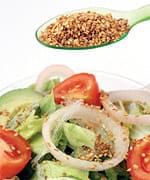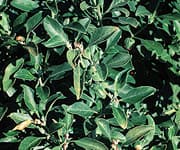Life Extension Magazine®
Grape Seed Extract Promotes Bone Formation | ||
Grape seed extract combined with calcium is more effective at building healthy bone mass than calcium alone, according to recent findings.12 To study the effects of proanthocyanidin-rich grape seed extract on bone health, researchers used an animal model of decreased bone mass. After the test subjects consumed a low-calcium diet for several weeks, they were fed a high-calcium diet, either alone or in combination with grape seed extract. The addition of grape seed extract to the calcium-rich diet produced dramatic results, including significantly higher bone mineral density, bone mineral content, bone cross-sectional area, and bone resistance to stress and strain. These important findings suggest that grape seed extract may help to support strong, dense bones. —Elizabeth Wagner, ND | ||
Ashwagandha May Fight Cancer by Suppressing NFkB | ||
The stress-relieving herb ashwagandha may offer powerful protection against cancer by inhibiting the activation of nuclear factor-kappa beta (NFkB), a protein that may contribute to inflammation and disease by activating certain genes.11 For the first time, scientists showed that ashwagandha compounds helped to suppress the activation of NFkB by a variety of agents that can provoke inflammation or cancer, such as pro-inflammatory cytokines, cigarette smoke, and certain medications. Since the activation of NFkB may stimulate the onset, proliferation, and spread of cancer, methods of modulating NFkB’s activity offer promise as anti-cancer strategies. Furthermore, ashwagandha constituents helped promote gene-expression patterns that support cancer cell self-destruction (apoptosis) and prevent cancer’s spread to other tissues. These findings help elucidate how ashwagandha may help to optimize well-being and life span. —Elizabeth Wagner, ND | ||
Silibinin May Inhibit Growth of Lung Cancer | ||
Silibinin, a flavanone compound from milk thistle, inhibits the growth and progression of lung cancer in an animal model of the disease, according to a new study published in the Journal of the National Cancer Institute.13 To investigate the cancer-fighting effects of silibinin, researchers injected mice with a cancer-causing agent, and then supplemented the diets of the some of the mice with varying amounts of silibinin. After 18 weeks, the silibinin-supplemented subjects exhibited up to 38% fewer tumors than those that did not receive silibinin. By week 29, the protective effect of silibinin was even more pronounced, with the silibinin-supplemented animals demonstrating up to 70% fewer tumors. The test subjects that received the highest dose of silibinin had a remarkable 93% fewer large tumors than the unsupplemented group. Also, tumor cells from the silibinin-supplemented group showed decreased levels of markers related to the ability to spread throughout the body. The research team concluded that silibinin may help inhibit the growth of lung tumors, in part due to its ability to inhibit the formation of blood vessels that feed growing tumors (angiogenesis). These encouraging preliminary results suggest that milk thistle-derived silibinin may hold promise in preventing the progression of deadly lung cancer. —Robert Gaston | ||
Gary Null, Life Extension Join Forces to Promote Health Freedom | ||
TIME magazine has called him “The New Mr. Natural,” and with good reason: for over 30 years, Gary Null has passionately committed himself to sharing the gift of vibrant health while trying to make a real difference in the lives and well-being of millions of Americans. Now, Gary is teaming with the Life Extension Foundation to bring the power of natural healing and the message of health freedom to the broadest possible audience. “For decades, Life Extension and I have been working toward the same goal: to provide consumers with freedom of choice on health care issues,” notes Null. “We’ve both taken on the FDA repeatedly, and had it not been for our combined efforts, it is unlikely that Congress would have enacted the Dietary Supplement Health and Education Act (DSHEA) in 1994. This legislation has enabled millions of Americans to enjoy access to safe, effective, and affordable dietary supplements.” Gary, a nationally syndicated talk show host and producer of PBS television specials, is also a consumer advocate, investigative reporter, New York Times bestselling author, and an award-winning documentary filmmaker. Life Extension collaborated with Gary on a recent film entitled Prescription for Disaster. This documentary takes a close look at patented drugs, why they are so readily prescribed, how insurance companies and HMOs promote compliance with drug therapy, and the problem of rising health care costs. It also explores alternatives to traditional pharmacology and drug therapy, such as vitamins and nutritional supplements, and why they are often perceived as a competitive threat by drug manufacturers. Prescription for Disaster was awarded a Platinum Award at last April’s 39th Annual WorldFest-Houston Film Festival. Gary also collaborated with Life Extension on an earlier report entitled “Death by Medicine,” which can read in its entirety on the Life Extension website. This fully referenced look at virtually every area and specialty of American medicine estimates that the total number of deaths caused by conventional medicine in the US is nearly 800,000 a year—making the American medical system the leading cause of death in the United States. Gary notes that both Prescription for Disaster and “Death by Medicine” have run into a “wall of silence” in the mainstream medical community and news media. He urges Life Extension members to order a copy of the film, read the report, and share this valuable information with friends and family because “it could literally save their lives.” —Robert Gaston | ||
| References | ||
| 1. Piller R, Chang-Claude J, Linseisen J. Plasma enterolactone and genistein and the risk of premenopausal breast cancer. Eur J Cancer Prev. 2006 Jun;15(3):225-32. 2. Preuss HG, Rchard B, Polansky MM, Anderson R. Whole cinnamon and aqueous extracts ameliorate sucrose-induced blood pressure elevations in spontaneously hypertensive rats. J Am Coll Nutr. 2006 Apr;25(2):144-50. 3. Estruch R, Martinez-Gonzalez MA, Corella D, et al. Effects of a Mediterranean-style diet on cardiovascular risk factors: a randomized trial. Ann Intern Med. 2006 Jul 4;145(1):1-11. 4. Stork S, Feelders RA, van den Beld AW, et al. Prediction of mortality risk in the elderly. Am J Med. 2006 Jun;119(6):519-25. 5. Watkins PB, Kaplowitz N, Slattery JT, et al. Aminotransferase elevations in healthy adults receiving 4 grams of acetaminophen daily: a randomized controlled trial. JAMA. 2006 Jul 5;296(1):87-93. 6. Larson AM, Polson J, Fontana RJ, et al. Acetaminophen-induced acute liver failure: results of a United States multicenter, prospective study. Hepatology. 2005 Dec;42(6):1364-72. 7. Chua B, Flood V, Rochtchina E, Wang JJ, Smith W, Mitchell P. Dietary fatty acids and the 5-year incidence of age-related maculopathy. Arch Ophthalmol. 2006 Jul;124(7):981-6. 8. Ferrucci L, Maggio M, Bandinelli S, et al. Low testosterone levels and the risk of anemia in older men and women. Arch Intern Med. 2006 Jul 10;166(13):1380-8. 9. Cowie CC, Rust KF, Byrd-Holt DD, et al. Prevalence of diabetes and impaired fasting glucose in adults in the U.S. population: National Health and Nutrition Examination Survey 1999-2002. Diabetes Care. 2006 June;29(6):1263-8. 10. Gangwisch JE, Heymsfield SB, Boden-Albala B, et al. Short sleep duration as a risk factor for hypertension: analyses of the first National Health and Nutrition Examination Survey. Hypertension. 2006 May;47(5):833-9. 11. Ichikawa H, Takada Y, Shishodia S, Jayaprakasam B, Nair MG, Aggarwal BB. Withanolides potentiate apoptosis, inhibit invasion, and abolish osteoclastogenesis through suppression of nuclear factor-{kappa}B (NF-{kappa}B) activation and NF-{kappa}B-regulated gene expression. Mol Cancer Ther. 2006 Jun;5(6):1434-45. 12. Ishikawa M, Maki K, Tofani I, Kimura K, Kimura M. Grape seed proanthocyanidins extract promotes bone formation in rat’s mandibular condyle. Eur J Oral Sci. 2005 Feb;113(1):47-52. 13. Singh RP, Deep G, Chittezhath M, et al. Effect of silibinin on the growth and progression of primary lung tumors in mice. J Natl Cancer Inst. 2006 Jun 21;98(12):846-55. |













